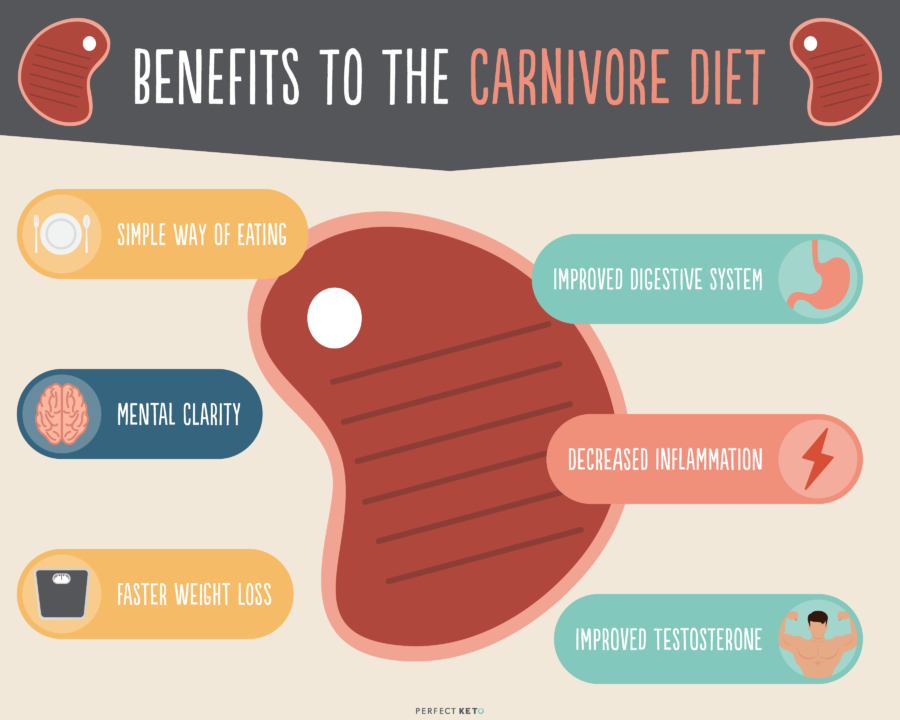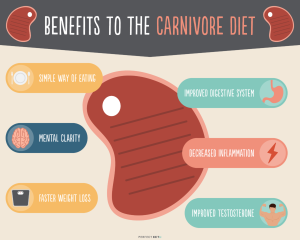- 20 October 2023
- 205
Carnivore Diet: Benefits, Drawbacks, and a Balanced Perspective

The Carnivore Diet, an exclusively animal-based dietary approach, has garnered attention for its reported benefits and potential drawbacks. In this article, we will explore the reported advantages of the diet, such as improved mental clarity, weight loss, and reduced inflammation, while also discussing the potential challenges individuals may face.
Benefits of the Carnivore Diet:
- Improved Mental Clarity:
- Advocates of the Carnivore Diet claim that eliminating plant-based foods can lead to improved mental focus and reduced brain fog. Some individuals report heightened cognitive clarity.
- Weight Loss:
- Due to the diet’s low carbohydrate content and high satiety from protein and fat, some people experience weight loss while following the Carnivore Diet.
https://www.perfectketo.com/wp-content/uploads/2018/05/benefits-to-the-carnivore-diet-900×720.png
- Due to the diet’s low carbohydrate content and high satiety from protein and fat, some people experience weight loss while following the Carnivore Diet.
- Reduced Inflammation:
- Certain proponents argue that the diet may alleviate inflammatory conditions, such as joint pain and autoimmune disorders, by eliminating potential dietary triggers.
- Digestive Health Improvement:
- Some individuals with gastrointestinal issues, such as irritable bowel syndrome (IBS) or inflammatory bowel disease (IBD), have reported symptom relief on the Carnivore Diet.
- Simplicity and Meal Planning:
- The diet’s simplicity eliminates the need for complex meal planning, making it appealing to those seeking dietary ease.
Drawbacks and Challenges:
- Nutrient Deficiencies:
- Excluding plant-based foods can lead to potential nutrient deficiencies, including vitamins C and K, fiber, and phytonutrients. This may require supplementation or careful food selection.
- Lack of Dietary Variety:
- The strict focus on animal-based foods can lead to dietary monotony, which may be unappealing for some individuals and challenging to maintain long-term.
- Digestive Changes:
- Transitioning to the Carnivore Diet may result in digestive challenges, such as constipation, due to the absence of dietary fiber. Individuals must adapt to these changes.
- Limited Social and Dining Options:
- Following this diet can be socially limiting, as it may restrict dining out and sharing meals with others.
- Environmental and Ethical Concerns:
- The Carnivore Diet’s reliance on animal products can raise ethical and environmental concerns, as some individuals may prefer a more sustainable and humane dietary approach.
- Long-Term Health Implications:
- The long-term health effects of the Carnivore Diet remain uncertain. Potential risks, such as heart disease and certain cancers due to high saturated fat and red meat consumption, have been raised.
https://weightdescent.com/wp-content/uploads/2021/09/Carnivore-diet-1024×612.png
- The long-term health effects of the Carnivore Diet remain uncertain. Potential risks, such as heart disease and certain cancers due to high saturated fat and red meat consumption, have been raised.
Conclusion: A Balanced Approach
The Carnivore Diet offers reported benefits, including mental clarity, weight loss, and reduced inflammation, but it also presents potential drawbacks and challenges. Individuals considering this diet should weigh the reported advantages against the potential risks, consult with healthcare professionals, and consider their personal preferences, ethical concerns, and long-term health goals before making dietary choices.



